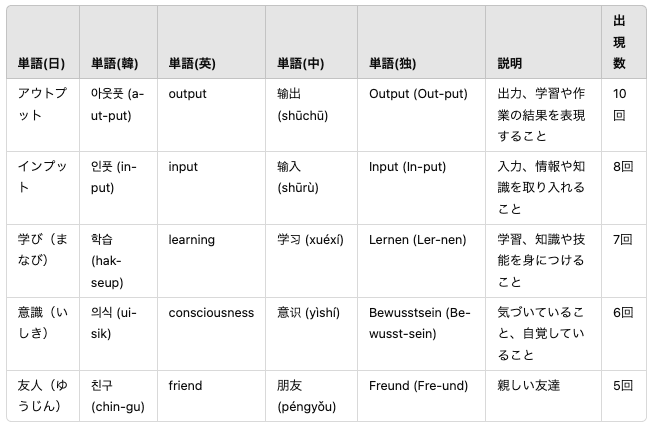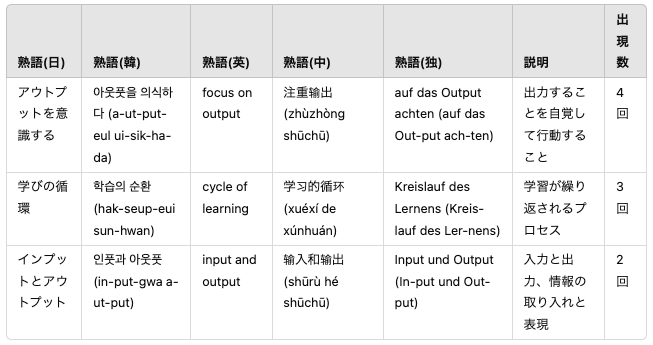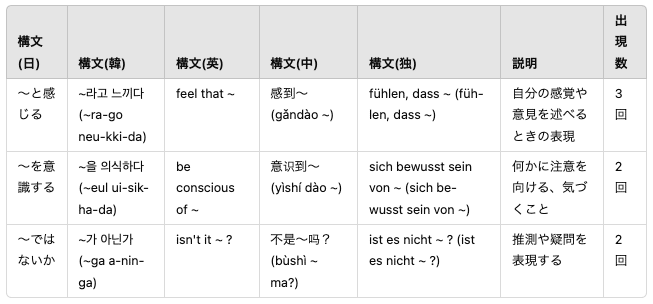
【DAY35】インプットだけでは便秘になる?学習のバランスを考える〜AIで進化する語学学習日記〜
学びの循環
私は、学ぶことはアウトプットを意識すると楽しくなると感じている。
ある日、友人の美咲とカフェで話していたとき、「IPO」という言葉が話題に上った。
「インプット(Input)、プロセッシング(Processing)、アウトプット(Output)の頭文字を取った言葉よ」と美咲が説明した。
「例えば、食事で言うと、ご飯を食べて(インプット)、体に吸収して(処理)、排泄する(アウトプット)という一連の流れを示すの」と彼女は続けた。
私は頷きながら考えた。語学学習も同じだ。リーディングやリスニングで情報を取り入れ(インプット)、考えたり記憶したりして(処理)、ライティングやスピーキングで表現する(アウトプット)。
「日本の教育は、これまでインプット重視だった気がするわ」と美咲が言った。
「でも、それでは便秘しがちね」と私は笑った。
「そう、アウトプットしないと体に悪いのよ」と彼女も笑顔で答えた。
「学びでは、もっとアウトプットを意識した方が良いのかもしれないね」と私は提案した。
「例えば、一ヶ月後に一分間の自己紹介ができるようになるとか、毎日日記を書く習慣をつけるとか」と美咲がアイデアを出した。
「そうだね。そして毎日、話したり書いたりすることで、不思議とリスニングやリーディングのスキルも自然と上がるかもしれない」と私は仮説を述べた。
「結論として、アウトプットを意識した学びが、便秘状態を改善する打開策になるのね」と美咲がまとめた。
私たちはお互いに微笑みながら、新しい学びの循環を感じていた。
The Cycle of Learning
I feel that learning becomes more enjoyable when you focus on output.
One day, while talking with my friend Misaki at a café, the term "IPO" came up.
"It's a word formed from the initials of Input, Processing, and Output," Misaki explained.
"For example, in terms of eating, it's like eating food (Input), digesting it (Processing), and excreting it (Output)—it's the flow of these processes," she continued.
I nodded and thought. Language learning is the same. You receive information through reading and listening (Input), think and memorize (Processing), and express through writing and speaking (Output).
"I feel that Japanese education has traditionally focused on input," Misaki said.
"But that tends to cause constipation," I laughed.
"Exactly, if you don't output, it's bad for your body," she replied with a smile.
"Perhaps in learning, we should focus more on output," I suggested.
"For example, aiming to be able to give a one-minute self-introduction in a month, or getting into the habit of writing a diary every day," Misaki offered ideas.
"Yes, and by talking and writing every day, perhaps, mysteriously, our listening and reading skills will naturally improve," I hypothesized.
"In conclusion, focusing on output in learning is a way to solve the state of constipation," Misaki summarized.
Smiling at each other, we both felt a new cycle of learning emerging.
학습의 순환
(Hak-seub-eui sun-hwan)
저는 학습은 아웃풋을 의식하면 즐거워진다고 느낍니다.
어느 날, 친구 미사키와 카페에서 이야기하던 중, 'IPO'라는 단어가 화제가 되었습니다.
"인풋(Input), 프로세싱(Processing), 아웃풋(Output)의 머리글자를 딴 말이야." 미사키가 설명했습니다.
"예를 들어 식사로 말하면, 밥을 먹고(인풋), 체내에 흡수하고(처리), 배설하는(아웃풋) 일련의 흐름을 나타내는 거지." 그녀는 계속 말했습니다.
저는 고개를 끄덕이며 생각했습니다. 어학 학습도 마찬가지입니다. 리딩이나 리스닝으로 정보를 받아들이고(인풋), 생각하거나 기억하고(처리), 라이팅이나 스피킹으로 표현합니다(아웃풋).
"일본의 교육은 지금까지 인풋 중시였던 것 같아." 미사키가 말했습니다.
"하지만 그럼 변비에 걸리기 쉽지." 제가 웃으며 말했습니다.
"그래, 아웃풋하지 않으면 몸에 해로워." 그녀도 미소로 답했습니다.
"학습에서는 더 아웃풋을 의식하는 편이 좋을지도 몰라." 제가 제안했습니다.
"예를 들어 한 달 후에 1분 자기소개를 할 수 있게 된다든지, 매일 일기를 쓰는 습관을 들인다든지." 미사키가 아이디어를 냈습니다.
"그래, 그리고 매일 말하거나 글을 쓰는 것으로, 신기하게도 리스닝이나 리딩 스킬도 자연스럽게 올라갈지 몰라." 제가 가설을 말했습니다.
"결론적으로 아웃풋을 의식한 학습이 변비 상태를 개선하는 돌파구가 되는 거네." 미사키가 정리했습니다.
우리는 서로 미소 지으며 새로운 학습의 순환을 느꼈습니다。
学习的循环
(Xuéxí de xúnhuán)
我觉得,当注重输出时,学习会变得更快乐。
有一天,我和朋友美咲在咖啡店聊天时,提到了“IPO”这个词。
“是由输入(Input)、处理(Processing)、输出(Output)的首字母组成的词。”美咲解释道。
“比如,在饮食方面,吃饭(输入)、身体吸收(处理)、排泄(输出),表示这一系列的流程。”她继续说道。
我一边点头一边思考。语言学习也是一样。通过阅读和听力接受信息(输入),思考和记忆(处理),通过写作和口语表达(输出)。
“我觉得日本的教育至今为止一直重视输入。”美咲说道。
“但这样容易便秘呢。”我笑着说。
“是啊,不输出对身体不好。”她也笑着回答。
“或许在学习中,更应该注重输出。”我提议道。
“例如,一个月后能够进行一分钟的自我介绍,或者养成每天写日记的习惯。”美咲提出了想法。
“是的,通过每天说话或写作,奇妙的是,听力和阅读等输入技能也会自然提升。”我提出了假设。
“总而言之,注重输出的学习是改善便秘状态的突破口呢。”美咲总结道。
我们相视一笑,感受到了新的学习循环。
Der Kreislauf des Lernens
Ich empfinde, dass Lernen mehr Spaß macht, wenn man sich auf das Output konzentriert.
Eines Tages, als ich mit meiner Freundin Misaki in einem Café sprach, kam der Begriff "IPO" zur Sprache.
"Das ist ein Wort, das aus den Anfangsbuchstaben von Input, Processing und Output besteht", erklärte Misaki.
"Zum Beispiel beim Essen: Wir essen Nahrung (Input), der Körper nimmt sie auf (Verarbeitung), und wir scheiden aus (Output) – das zeigt den gesamten Prozess", fuhr sie fort.
Ich nickte nachdenklich. Sprachenlernen ist dasselbe. Wir nehmen Informationen durch Lesen und Hören auf (Input), denken und merken sie uns (Verarbeitung), und drücken uns durch Schreiben und Sprechen aus (Output).
"Ich habe das Gefühl, dass die japanische Bildung bisher den Input betont hat", sagte Misaki.
"Aber so neigt man zu Verstopfung", lachte ich.
"Genau, ohne Output ist es schlecht für den Körper", antwortete sie lächelnd.
"Vielleicht sollten wir beim Lernen mehr auf das Output achten", schlug ich vor.
"Zum Beispiel in einem Monat in der Lage sein, eine einminütige Selbstvorstellung zu machen, oder die Gewohnheit entwickeln, täglich ein Tagebuch zu schreiben", brachte Misaki Ideen ein.
"Ja, und indem wir täglich sprechen oder schreiben, steigen vielleicht auf wundersame Weise auch unsere Fähigkeiten im Hören und Lesen", hypothesierte ich.
"Zusammenfassend ist ein auf Output fokussiertes Lernen ein Mittel, um den Zustand der Verstopfung zu verbessern", fasste Misaki zusammen.
Wir lächelten uns an und spürten einen neuen Kreislauf des Lernens.
AIのフィードバック
K(Keep:良かった点)
具体的なエピソードを通じたテーマの提示:友人との対話を通して「IPO」という学習のサイクルを紹介しており、読者に親近感を与えています。
ユーモアを交えた比喩の使用:学びと消化を「便秘」に例えることで、アウトプットの重要性をわかりやすく、かつ面白く伝えています。
前向きな結論とメッセージ:最後に「新しい学びの循環を感じていた」と締めくくることで、学びへの意欲やポジティブな姿勢が伝わります。
P(Problem:改善が望まれる点)
「IPO」の一般的な意味との混同の可能性:「IPO」は通常「新規株式公開」を指すため、読者が混乱する可能性があります。
比喩の過度な繰り返し:「便秘」の比喩が何度も出てくるため、少し強調しすぎている印象を与えるかもしれません。
情景描写や感情表現の不足:カフェの雰囲気や登場人物の表情・感情があまり描かれておらず、物語に深みが欠ける可能性があります。
T(Try:次回試してほしい点)
用語の選択に注意する:「IPO」の一般的な意味に触れるか、別の略語(例:「IPOC」— Input, Processing, Output, Communication)を検討してみてください。
比喩表現の多様化:「便秘」以外の比喩や例えを用いることで、読者の興味を維持しつつ、テーマを深めることができます。
情景や感情の描写を豊かにする:カフェの様子や登場人物の内面を詳しく描くことで、物語に臨場感と深みを加えてみてください。
K (Keep: Positive Aspects)
Effective presentation of the theme through a specific episode: Introducing the learning cycle of "IPO" through a conversation with a friend makes the concept relatable for readers.
Use of humor through metaphors: Comparing learning to "constipation" humorously emphasizes the importance of output in an understandable way.
Positive conclusion and message: Ending with "feeling a new cycle of learning" conveys enthusiasm and a positive attitude toward learning.
P (Problem: Areas for Improvement)
Potential confusion with the common meaning of "IPO": Since "IPO" typically stands for "Initial Public Offering," readers might be confused.
Overuse of the same metaphor: Repeated references to "constipation" may seem overemphasized and could detract from the main message.
Lack of scene and emotional descriptions: Minimal details about the café's atmosphere or the characters' emotions might make the narrative feel less engaging.
T (Try: Suggestions for Next Time)
Be mindful of term selection: Consider acknowledging the common meaning of "IPO" or using a different acronym (e.g., "IPOC"—Input, Processing, Output, Communication) to prevent confusion.
Diversify metaphors and examples: Using different metaphors or examples can deepen the theme while keeping the reader's interest.
Enhance descriptions of setting and emotions: Adding vivid details about the café and delving into the characters' inner thoughts can add depth and make the story more immersive.
学ぶ
1. 頻出単語

2. 頻出熟語

3. 頻出構文

